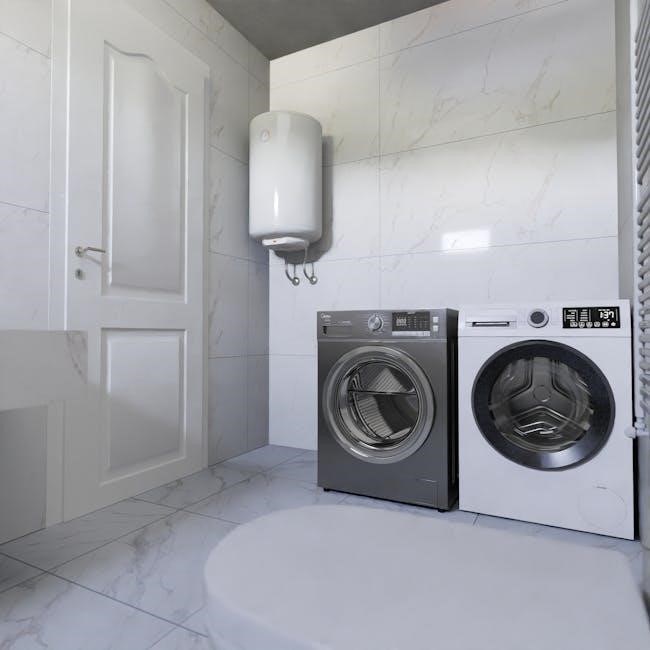This guide provides detailed steps for diagnosing and resolving common issues with Frigidaire front load washers‚ ensuring optimal performance and extending appliance life through effective troubleshooting.
1.1 Common Issues and Basic Diagnostic Steps
Frigidaire front load washers often face issues like error codes (e.g.‚ 11 beeps or “UB” for unbalanced loads)‚ clogged drains‚ or faulty door locks. Basic diagnostics include checking error code meanings‚ ensuring balanced loads‚ cleaning filters‚ and verifying proper detergent use. Regular maintenance‚ such as running cleaning cycles‚ can prevent grime buildup and sensor malfunctions. Always consult the user manual or online resources for specific troubleshooting guidance.
1.2 Importance of Regular Maintenance
Regular maintenance is crucial for ensuring the reliability and longevity of your Frigidaire front load washer. Cleaning cycles help remove built-up grime‚ while checking and cleaning filters prevents clogs. Proper detergent use‚ such as measuring HE detergent according to load size‚ avoids overuse. Scheduling routine checks and addressing minor issues promptly can prevent major malfunctions‚ ensuring optimal performance and extending the appliance’s lifespan effectively.
This section explains common error codes like the 11-beep error and “UB” for unbalanced loads‚ helping users identify and resolve issues quickly. Refer to the guide for detailed solutions.
2.1 Understanding the 11-Beep Error Code
The 11-beep error code on a Frigidaire front loader indicates a specific issue‚ such as a malfunctioning sensor or control panel problem. This code is part of the diagnostic system designed to alert users to potential faults. By understanding this code‚ users can take appropriate steps to address the issue‚ whether it involves resetting the machine or seeking professional assistance. Regular maintenance and prompt troubleshooting can prevent such errors from recurring‚ ensuring smooth operation.

Common Error Codes and Their Meanings
2.2 Decoding the “UB” Error Code for Unbalanced Loads
The “UB” error code signifies an unbalanced load in your Frigidaire front load washer‚ often caused by uneven distribution of laundry. This can lead to vibration and noise during operation. To resolve this‚ redistribute the load evenly‚ ensuring proper balance. Reducing the load size if necessary can also help prevent this error‚ ensuring a smoother and quieter wash cycle. Regular checks on load balance can minimize future occurrences.
Door Lock Issues and Solutions
Frigidaire front load washer door lock issues often arise from accidental activation or mechanical faults. Check for child safety locks or inspect the lock mechanism for proper function and alignment to ensure smooth operation and prevent unnecessary delays in your laundry routine.
3.1 Child Safety Lock Activation and Deactivation
The child safety lock on your Frigidaire front load washer prevents accidental starts. If activated‚ press and hold the Lock button for 3 seconds to deactivate. If the lock was activated accidentally‚ ensure the washer is unplugged for 30 seconds before retrying. Regularly check the lock mechanism to ensure proper function and avoid unintended activation during laundry cycles.
3.2 Troubleshooting a Faulty Door Lock Mechanism
If the door lock mechanism fails to engage or disengage‚ first ensure the door is fully closed. Check for debris or obstructions. If issues persist‚ unplug the washer and inspect the latch and striker alignment. A misaligned striker can prevent proper locking. For persistent faults‚ consult a professional or replace the lock assembly to restore proper function and safety during operation.
Cleaning and Maintaining Your Frigidaire Washer
Regular cleaning and maintenance are essential to prevent odor buildup‚ improve efficiency‚ and extend the life of your Frigidaire washer. Run a cleaning cycle periodically.
4.1 Running a Cleaning Cycle to Remove Built-Up Grime
Running a cleaning cycle helps remove built-up grime‚ detergent residue‚ and odors from your Frigidaire washer. Use a cleaning tablet or vinegar to scrub internal components. This cycle is essential for maintaining freshness and efficiency. Regular cleaning prevents mold growth and ensures optimal performance. Always follow the manufacturer’s instructions for the best results and to keep your washer in top condition.
4.2 How to Clean the Washing Machine Filter
Cleaning the washing machine filter is crucial for maintaining proper drainage and preventing clogs. Locate the filter‚ usually at the bottom or back of the washer. Remove it and rinse thoroughly with warm water to eliminate debris. Regularly cleaning the filter ensures smooth operation and prevents issues like slow draining or error codes. Check and clean it every 1-2 months for optimal performance.
Drainage and Pump Issues
Drainage and pump issues often arise from clogs or kinked hoses. Regularly inspect and clear these areas to ensure smooth water flow and prevent machine malfunction.
5.1 Identifying Clogs in the Washer Drain or Pump
Clogs in the washer drain or pump often result from detergent buildup‚ debris‚ or foreign objects. Check for slow draining‚ unusual noises‚ or error codes. Regularly inspect and clean the drain pump filter to prevent blockages. Ensure the drainage hose is not kinked or twisted‚ as this can impede water flow and lead to machine malfunction during wash cycles.
5.2 Fixing Kinked or Blocked Drainage Hoses
Inspect the drainage hoses for kinks or twists that may restrict water flow. Straighten any bent sections and ensure the hoses are securely connected to both the washer and the drain. If blockages are present‚ disconnect the hoses and clean them thoroughly. Regularly checking and maintaining the hoses helps prevent clogs and ensures proper drainage during wash cycles‚ maintaining optimal washer performance.
Electronic Control Panel Troubleshooting
Ensure all buttons and displays on the control panel are functioning properly. Run a test cycle to verify responsiveness and correct operation of integrated controls.
6.1 Checking the Functionality of Integrated Controls
Start by pressing each button on the control panel to ensure they respond correctly. Check the display for clear readings and accurate cycle selections. Verify that the controls adjust settings like temperature and spin speed without issues. If any button or feature malfunctions‚ it may indicate a faulty sensor or software glitch requiring professional attention or a control panel reset.
6.2 Resetting the Electronic Control Panel
To reset the electronic control panel‚ unplug the washer from the power source for 30 minutes. This action clears any temporary glitches or errors stored in the system memory. After plugging it back in‚ run a test cycle to ensure proper functionality. If issues persist‚ consult the user manual or contact an authorized technician for further assistance and potential software updates.
Faulty Sensors and Computer Malfunctions
Sensors monitor washing conditions‚ while computer malfunctions can disrupt cycles. Symptoms include error codes or uneven drying. Professional diagnostics may be needed to repair or replace faulty components.
7.1 Diagnosing Faulty Sensors
Sensors in Frigidaire front load washers monitor temperature‚ water levels‚ and load balance. Faulty sensors can cause error codes like “UB” for unbalanced loads. Diagnose by checking connections‚ ensuring proper calibration‚ and running diagnostic cycles. If issues persist‚ replacing the sensor may be necessary to restore normal operation and prevent further malfunctions.
7.2 Understanding Computer-Related Faults
Computer-related faults in Frigidaire front load washers can stem from software glitches or faulty control panels. Symptoms include unresponsive controls‚ inconsistent operation‚ or error codes. Check connections and reset the control panel by unplugging the washer for 30 minutes. If issues persist‚ updating software or replacing the control panel may be required to restore functionality and ensure proper operation.
Using the Right Detergent for Optimal Performance
Using high-efficiency (HE) detergent and properly measuring it according to load size ensures optimal performance and prevents issues from overuse.
8.1 Importance of High-Efficiency (HE) Detergent
High-efficiency detergent is specifically designed for front-load washers‚ producing fewer suds and preventing residue buildup. Using HE detergent ensures proper cleaning‚ prevents clogs‚ and avoids damage to your washer. Non-HE detergents can leave behind excess foam‚ leading to poor performance and potential malfunctions. Always measure detergent according to load size to maintain optimal function and extend your washer’s lifespan.
8.2 Avoiding Overuse of Detergent
Overusing detergent can lead to excessive suds‚ clogs‚ and poor drainage in your Frigidaire washer. This can cause malfunctions and error codes like “UB” for unbalanced loads. Always measure detergent according to the load size and fabric type. Using too much detergent can leave residue on clothes and damage the washer over time. Adhere to the recommended guidelines to ensure optimal performance and prevent issues.
Bearing Failure Signs and Prevention
Bearing failure in Frigidaire washers often causes loud noise and vibration. Regular maintenance‚ balanced loads‚ and prompt repairs can prevent premature wear and costly replacements.
9.1 Recognizing the Symptoms of Bad Bearings
Bearing failure in Frigidaire front load washers often manifests as loud grinding or rumbling noises during operation. Excessive vibration‚ uneven spinning‚ or complete stoppage of the drum may also occur. These symptoms typically worsen over time if left unaddressed‚ leading to further damage. Regular monitoring of your washer’s performance can help identify these issues early‚ preventing costly repairs or even appliance replacement.
9.2 Preventing Bearing Failure
Preventing bearing failure in Frigidaire front load washers involves regular maintenance and proper usage. Ensure balanced loads to avoid excessive strain‚ and run cleaning cycles to remove debris. Check and replace worn-out seals to prevent water leakage. Additionally‚ using high-quality HE detergent and avoiding overloading can reduce wear on bearings‚ promoting smoother operation and extending the appliance’s lifespan. Routine inspections can also detect early signs of wear.

Water Level and Laundry Load Issues
Addressing water level and load size issues ensures balanced washing. Proper detergent use and load adjustments maintain performance‚ preventing errors like unbalanced loads and optimizing cleaning efficiency.
10.1 Understanding Normal Water Levels
Normal water levels in Frigidaire front load washers are designed to cover the laundry load without overfilling. Proper water levels ensure efficient cleaning and prevent issues like unbalanced loads or excessive noise. Overfilling can lead to poor washing performance‚ while insufficient water may leave clothes soiled. Always check the water level sensor and ensure it’s functioning correctly for optimal results.
10.2 Adjusting Load Size for Balanced Washing
Proper load size adjustment is crucial for balanced washing in Frigidaire front load washers. Overloading can cause unbalanced loads‚ leading to error codes like “UB” and poor performance. Use the machine’s load size indicators or consult the user manual to determine the ideal load size. Always balance heavy and light items to ensure smooth operation and prevent damage to the washer during the cycle.
Troubleshooting the Washing Cycle
Identify issues during the wash cycle‚ such as error codes or paused operation. Check power supply‚ detergent use‚ and load balance. Resetting the washer or running a diagnostic cycle may resolve common problems. Ensure proper cycle selection for optimal performance and refer to the user manual for specific solutions to cycle-related issues.
11.1 Selecting the Correct Washing Mode
Selecting the right washing mode ensures optimal cleaning and fabric care. Choose modes like “Normal‚” “Delicate‚” or “Heavy Duty” based on load type and soil level. Using the wrong mode can lead to poor cleaning results or damage to fabrics. Always refer to your user manual for mode descriptions and cycle options to match your laundry needs effectively and avoid common cycle-related issues.
11.2 Identifying Issues During the Wash Cycle
During the wash cycle‚ monitor for unusual noises‚ vibrations‚ or stopped operation. Check for error codes like “UB” for unbalanced loads or “11 beeps” indicating control panel issues. Ensure proper detergent use and load size. Verify the washer is level to prevent vibrations. If issues arise‚ pause the cycle‚ check settings‚ and restart. Consult the user manual or troubleshooting guide for specific solutions and guidance.

General Maintenance Tips
Regular maintenance is key to preventing issues. Clean the filter and gasket‚ check hoses for kinks‚ and ensure proper detergent use. Schedule periodic checks to maintain performance and longevity‚ ensuring your washer operates efficiently and effectively over time.
12.1 Scheduling Regular Appliance Maintenance
Regular maintenance is crucial for optimal performance. Schedule periodic checks to clean the filter‚ inspect hoses‚ and ensure proper detergent use. Plan monthly cleaning cycles and annual professional inspections. Replace worn parts promptly to prevent breakdowns. Consistent upkeep ensures efficiency‚ reduces repair needs‚ and extends the lifespan of your Frigidaire front load washer.
12.2 Registering Your Appliance for Support
Registering your Frigidaire front load washer ensures access to exclusive support‚ personalized tips‚ and maintenance reminders. Visit the manufacturer’s website‚ provide your appliance details‚ and complete the registration process. This step unlocks extended warranties‚ priority service‚ and tailored advice to keep your washer performing at its best and address any issues promptly.

When to Call a Professional
DIY troubleshooting has limits. Contact a certified technician if issues persist‚ especially for complex faults like sensor malfunctions or pump failures‚ to ensure safe repairs.
13.1 Knowing When DIY Troubleshooting Isn’t Enough
Determine when professional help is needed by assessing the complexity of the issue. DIY troubleshooting is effective for minor problems like clogged filters or error codes‚ but complex faults such as faulty sensors‚ pump failures‚ or computer malfunctions require specialized tools and expertise that only authorized technicians can provide.
13.2 Finding Authorized Service Providers
Locate authorized Frigidaire service providers by visiting the official website or contacting customer support. Use your appliance’s model number for accurate service recommendations. Ensure technicians are certified to guarantee genuine parts and warranty compliance. Additionally‚ check reviews and ratings to find reliable professionals who can address complex issues effectively and provide expert advice for maintaining your washer’s performance and longevity.





